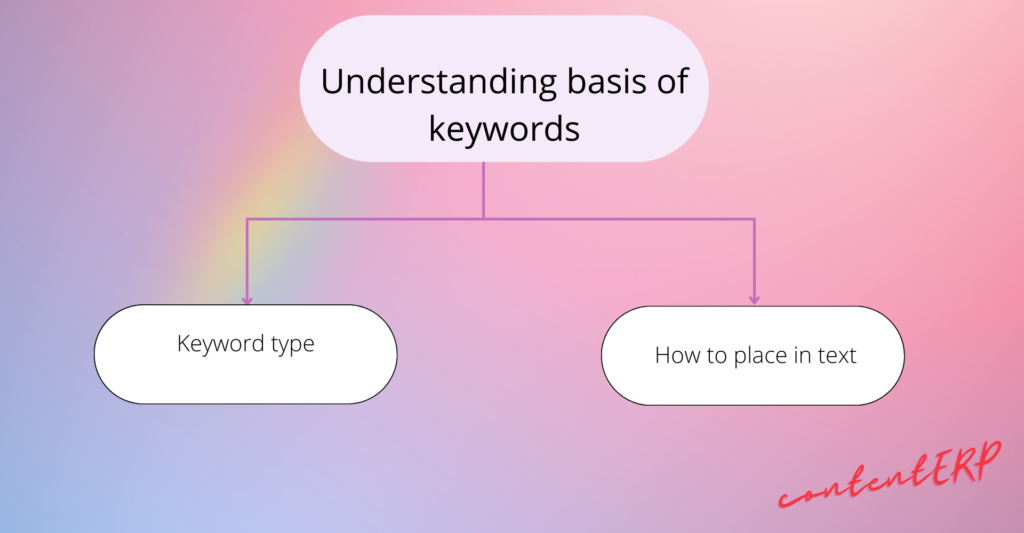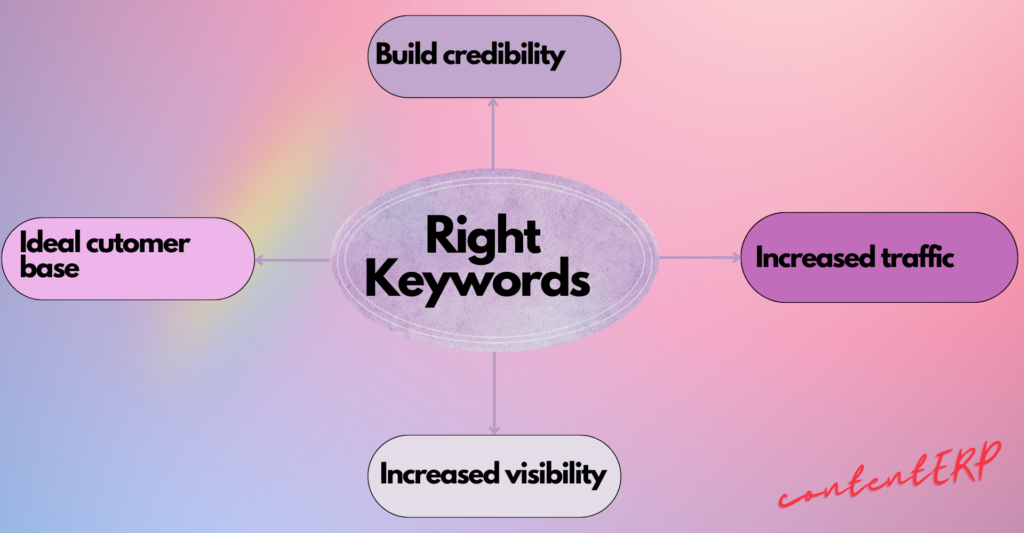Why is it important to choose the right keywords
We discussed the importance of keywords in SEO in our previous article, and now it is time to look at why it is important to choose the right keywords for your web content.
With the right digital marketing strategy, your organization will quickly reach more customers, increasing your profits. A central aspect of this effort involves choosing the right keywords.
Understand your keyword types
Different websites and businesses have different keyword requirements. Before diving into the vast ocean that is keyword research, it is of absolute importance that you first understand:
- Your business and content you want to post on your webpages
- Your audience search intent

Understanding the type of content and your intended market will help you narrow down your research to the keyword types in your selected category. Please read our article on keyword types for more information on all the keyword types.
Importance of choosing the right keywords
Keywords play a huge role in connecting websites to their audience and getting the much coveted organic traffic. For this reason, it’s important to understand keywords and the delicate science of choosing the right keywords for your content.
Search engine algorithms and keywords
Good ranking of your site on search engines will depend to a large extent on the choice and use you make of your keywords and key expressions.
Google and its competitors are no longer satisfied with simply filling pages with keywords without giving structured information. The days when it was enough to put them on the fly and stuff keywords (keyword stuffing) are over.
A few years ago, choosing your keywords carefully and placing them regularly in your text was enough. Then, ranking on SERPs with mediocre content was possible, but the Google search algorithm has evolved from its toddler days. It has adapted to giving priority to user experience and can now recognize and promote quality content that meets searchers’ expectations.
As it has become more demanding, it is clearly in the interest of readers looking for quality writing, concise texts, and good overall architecture. To get better positioning in search engine results and therefore have better traffic, content writers must ensure that they:
- Are meeting the expectations of Internet users.
- Are informative and didactic.
- Answer a searcher’s most immediate questions.
- Use quality keywords to satisfy Google.

Target your ideal customer base
You must target the right audience to succeed when creating a business or website.
For example: Suppose you start a website about “baseball.” So writing articles about “softball” cannot make baseball fans interested in your website though these are similar topics.
You want to create exciting and relevant content for your clients and prospects. Keyword research will help you figure out what your audience is looking for. Then you can write or create content around that.
Builds social media shares and increases visibility
After doing the relevant keyword research, you can provide people with the proper information about what they want using the right keywords. When your audience connects with your content and finds it relevant to them, they are more likely to share it on their social media pages. In this way, your website will grow and advance organically. This will need less effort in the area of link building.
People tend to share what they like on their social platforms like Twitter and Facebook. So, if you are creating articles or images, then be sure to add the right keywords that will entice your audience.
Provide Credibility and Help Build Page Authority
Using the right keywords also helps build credibility. Using the right words, phrases, or jargon gives the impression that you are an expert in the subject matter.
Keywords are essential to avoid sounding amateurish. Keywords help build page authority, giving website visitors an immediate sense of being at the right place to have their queries answered.
Improve your ad targeting
Keyword strategies are highly beneficial for paid search, not just organic SEO. When you run online ads (which place your website or landing pages above organic search results), keep your keyword strategy in mind to ensure your keyword terms align with your business goals.

Google still ensures that any keywords used in targeted ads are relevant to a searcher’s needs. Choosing the right keywords to make your ads appear on search results is crucial.
Keep Up with Competition
When it comes to the Internet, content is king. Good content is rewarded by both the search engines (with higher rankings in search results) and the users (with more traffic to the website).
If you want to keep up with competitors and be relevant long-term, then keyword-enriched content is what you should concentrate on. You can meet your competitors head-on with the right keywords and have a strong foothold in the online marketplace.
Increased conversion
If you create content your audience finds interesting; they’ll want to learn more and might interact with other web content on your website. The conversion of traffic to your site to potential customers can only be possible if the content they interact with is correct.
It is not enough to use a bunch of irrelevant keywords to your web content or slap any selection of keywords to your text. Choosing the right keywords can mean different interactions with your website.
What Not To Do With Keywords
Keyword stuffing
As mentioned before, keywords are important for visibility. However, over-optimization can prove to be counter-productive. Search engines now can easily recognize sites that provide poor-quality and irrelevant content.
Overdoing it will only hurt the user experience. So, don’t try to be smart because search engines are smarter. You should undoubtedly incorporate as many keywords as possible, but only the useful ones.
Optimize all pages on the website
Unless your website has only one page, it should be taken as a whole, and each page should be interconnected. This will maintain a seamless flow of information and make it easy for users to navigate your site. Thus, avoid gaps or information asymmetry and don’t work on each page in a silo.

Don’t use off-topic keywords.
It is a no-brainer that your content should not have keywords unrelated to your subject matter. You could bring in shampoos and oils if you write about hair care, but you cannot talk about electric switches! The importance of keywords is to help search engines show relevant content to the target audience. If your content has irrelevant keywords, it won’t appear for the right searches. And, no customer would be happy to see an unrelated page while searching.
Don’t just use keywords anywhere in the content.
It should not appear forced. Keywords should be incorporated to maintain the natural flow of the content. If the SEO keyword importance hampers the readability of the content, there is no point. Keywords must be related to the subject matter and should make sense. Conduct a thorough keyword search before beginning the writing process.
Conclusion
Keywords are important in content strategizing. As a web content creator, whether copywriter or general writer, knowing your keyword base and ensuring each web copy uses the right keywords is your responsibility.
The right keywords will move your website from the ordinary, sub-par content provider to a well-respected, high-ranking site that is relevant and trusted to your target audience.

